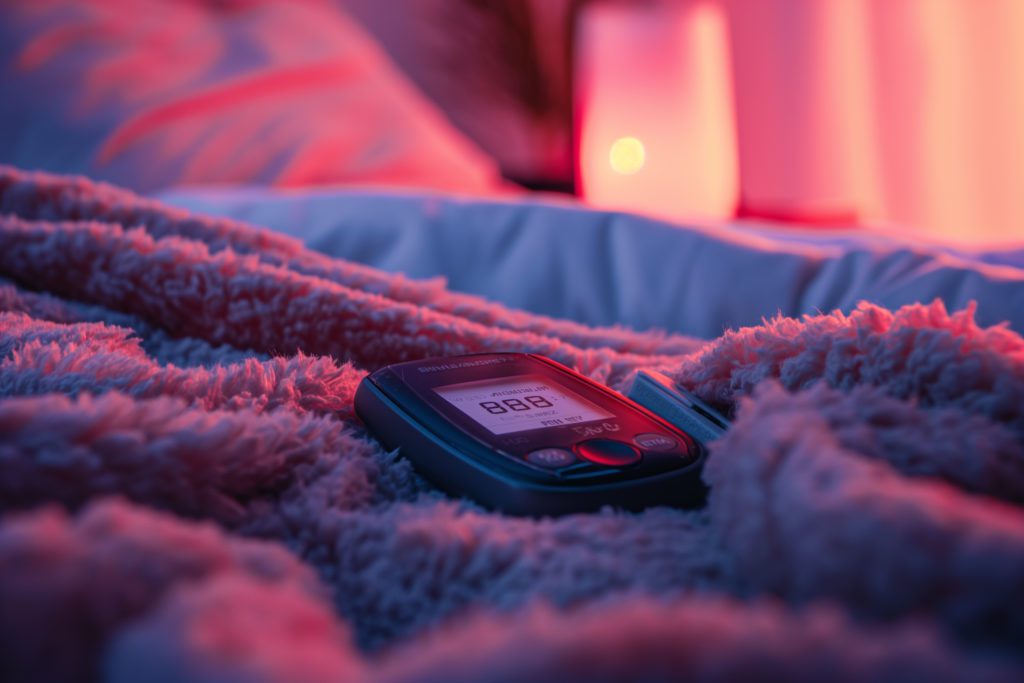
The Link Between Diabetes and Sleep (What You Need to Know)
Discover the surprising way your sleep patterns can influence diabetes risk and why getting enough Z's could help ward off the disease.

Explore how poor sleep quality can influence your diabetes risk
Did you know that the secret to reducing your risk of diabetes might just lie in your bed? It sounds almost too simple, yet numerous studies have unveiled a critical link between the quality of our sleep and our susceptibility to diabetes. This connection, often overshadowed by more well-known risk factors like diet and exercise, suggests that the path to a healthier life could also be paved with good sleep habits.
In this article, we're peeling back the layers on how exactly sleep—or the lack thereof—plays a pivotal role in diabetes risk. Whether you're navigating life with diabetes along with 38.4 million U.S. citizens or looking to prevent it, understanding the sleep-diabetes nexus could make a difference to your future well-being.
Join us as we explore actionable insights and strategies to harness the power of sleep in diabetes management and prevention, shining a light on why closing your eyes might just be the most important step you take toward safeguarding your health.
Sleep nurtures your overall health
Sleep isn't just a passive activity or a short break from the hustle and bustle of daily life; it's a critical period for restoration and healing that our bodies desperately need. During the quiet of the night, our bodies engage in various restorative processes, from repairing muscle tissue to consolidating memories and balancing hormones. Unsurprisingly, this rejuvenation session is just what your body needs.
Moreover, skimping on sleep can kick off a domino effect, jeopardizing your heart, blood vessels, and even your waistline. It messes with hormones that signal hunger or fullness and tweaks how your body responds to insulin, nudging you closer to conditions like diabetes. So, if your sleep schedule's off-kilter, you're not just facing a rough morning; you're potentially setting the stage for long-term health challenges.
The connection between diabetes and sleep
Zeroing in on the connection between sleep and diabetes, it turns out that how much shut-eye you get could be making a big difference in your risk for the condition. Dig into the research, and you'll find that the relationship between your nightly Z's and diabetes isn't just bedtime talk.
Studies highlighted in Diabetes Care have shown a significant link: sleeping less than the recommended seven hours increases your diabetes risk by 9% for each hour lost, while overshooting the sleep mark can up it by 14% per extra hour. Both ends of the sleep spectrum—too little or too much—can push you into risky territory for type 2 diabetes, with interrupted sleep also throwing fuel on the fire.
This connection points to a simple yet often overlooked fact: quality sleep is a cornerstone of good health. Beyond counting sheep or guzzling caffeine to stay awake, understanding how sleep impacts your body's sugar processing might just be the wake-up call needed to prioritize those precious hours of rest.
Sugar, sleep, and science
Let's peel back another layer of the sleep-diabetes connection by honing in on the specifics: the roles of insulin and hunger. When we miss out on sleep, our bodies go into a kind of overdrive, altering the way they handle insulin, the hormone responsible for converting sugar into energy.
Sleep deprivation can make our bodies less sensitive to insulin's effects, leading to a condition known as insulin resistance. This is where our cells start ignoring insulin's call to take up sugar, causing blood sugar levels to rise and laying down a red carpet for type 2 diabetes.
But the plot thickens with our appetite hormones—ghrelin and leptin. Ghrelin, the "I'm hungry" hormone, goes into overproduction when we're sleep deprived, signaling our brains to demand more food. Meanwhile, leptin, which tells us "I'm full, stop eating," takes a backseat. This imbalance often leads to overeating, and when we reach for high-sugar or fatty foods for a quick energy boost, it's a double whammy for our blood sugar levels.
So, combining insufficient sleep with its impact on insulin resistance and a boosted appetite, we're looking at a perfect storm for diabetes risk. Recognizing this interplay gives us a clear target: improving sleep quality as a direct line of defense against diabetes.
Sweet dreams—without the diabetes risk
We’ve established just how important sufficient slumber is for your overall health, so here’s how you can turn your bedroom into a haven for healthy sleep:
Set a regular sleep schedule
Consistency is key. Try to go to bed and wake up at the same times every day to help regulate your body's internal clock.Create a restful environment
Ensure your bedroom is cool, quiet, and dark. Consider using blackout curtains, earplugs, or white noise machines if necessary.}Keep stress levels in check
Engage in relaxation techniques before bed, like deep breathing, meditation, or reading, to help calm your mind.Limit screen time
Reduce exposure to blue light from screens at least an hour before bedtime, as it can interfere with your ability to fall asleep.Keep moving
Regular physical activity can help you fall asleep faster and enjoy deeper sleep, but try to avoid vigorous exercise close to bedtime.Use tech as your ally
Leverage technology like glucose monitors to keep an eye on your blood sugar levels and sleep tracking apps to understand your sleep patterns better.
If sleep issues persist, it might be time to consult with a healthcare provider to identify any underlying conditions or to discuss further strategies for improving sleep quality.
The takeaway: Cut your risk of diabetes by securing good sleep
Turns out, hitting the sack is more powerful than we thought, especially when it comes to keeping diabetes at bay. It's not just about clocking in those hours; it's about giving your body a fighting chance against risks we often don't see coming. Think of good sleep as your secret weapon—a simple yet effective move towards not just dodging diabetes but boosting your overall health. So, let's not just dream about better health—let's sleep our way there. Tonight, as you tuck in early, know you're doing something great for yourself.

Written by
Georgia Austin
Professionally trained copywriter, editor, and content marketing strategist with over 7 years of experience—working with brands like Nike, Siemens, Toshiba, Tommy Hilfiger, Culture Trip, and Klook.
Download Pillow
Get help
Press & News
Legal
Connect
X (Twitter)
Company
Copyright © Neybox Digital Ltd.



